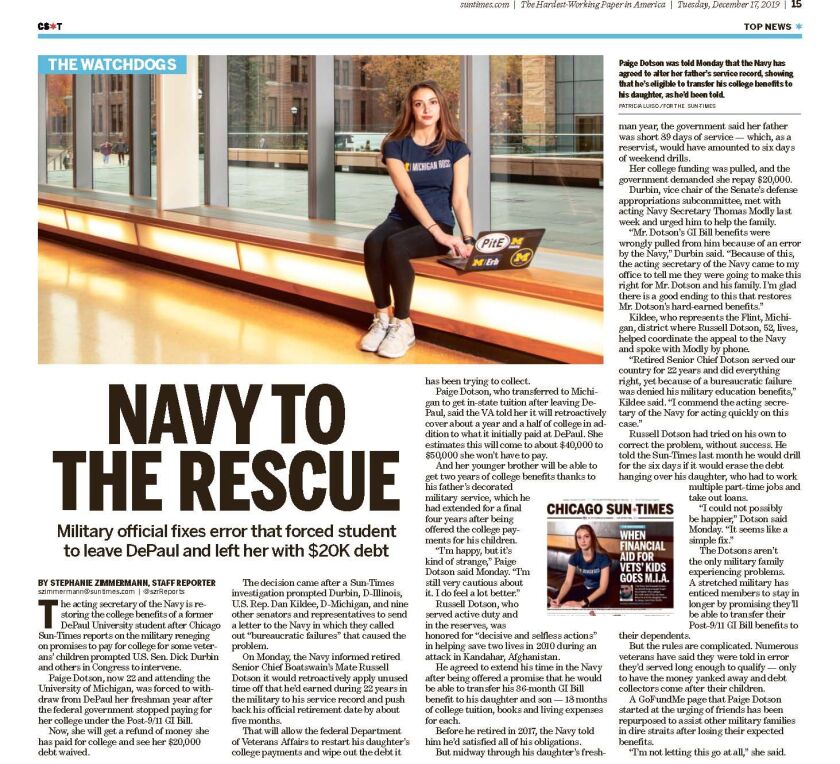It’s been a year since the Chicago Sun-Times reported that, because of bureaucratic snafus, some veterans were being denied their right to share with their children the college benefits they earned by serving extra years in the military.
Some backpedaling followed, most notably involving the acting secretary of the Navy erasing a $20,000 debt for a student from Michigan who left DePaul University after her tuition payments suddenly were withdrawn.
Yet some veterans and their families are still being told they can’t tap the college benefits that the Post-9/11 GI Bill entitles them to pass along to their children.
“It was devastating,” says Carl Hill, a disabled vet who was counting on his daughter being able to use his Post-9/11 GI Bill benefits for a two-year firefighter/paramedic program. “You’re, like, how can this be real?”
Some veterans didn’t find out until their kids were applying to college that there was a problem in the calculation of their retirement dates and that, as a result, their children wouldn’t get a penny. And this was after they stayed on in the military years longer to qualify.
Other vets were approved, and their kids went to college, only to have the government cut off payments for tuition, housing and other costs and try to get the money back from the student.
The federal Department of Veterans Affairs acknowledges that errors have resulted in the government withdrawing benefits and leaving a veteran’s child suddenly facing an unexpected debt. But the VA says this happens only rarely.
But for veterans’ families, “The consequences are huge,” says Aniela Szymanski, senior director for legal affairs and military policy for Veterans Education Success, a not-for-profit that helps vets.
For some vets, serving longer so they then could share their Post-9/11 GI Bill benefits with their children was their only plan to pay for college. They hadn’t saved up or put money into a 529 plan.
“They can’t go back in time and make up for this error,” Szymanski says.
Congress passed the Post-9/11 GI Bill to give veterans the equivalent of four years of free college. It later allowed them to share those educational benefits with their families in exchange for extending their military service — typically by four years.
Hill, 44, now lives in Kalispell, Montana. He served 10 years in the Air Force and Air National Guard, then switched to the Navy, where, seven years in, his service — which included time in Iraq — had taken a toll. He had a brain injury, post-traumatic stress and back, shoulder and knee issues. He was treated at Walter Reed National Military Medical Center and eventually was medically retired in November 2019.
Before leaving the Navy, Hill put in to transfer his college benefits to his daughter. Hill’s years of service and his medical retirement qualified him. But when his daughter tried to access that money for college, the VA said no.
Hill says he was told he hadn’t filed a medical form with an office handling GI Bill transfers — a requirement he says he never got word of because it was sent to an old email address.
He plans to appeal the decision with free legal services from Veterans Education Success.
Veterans advocates say the problems Hill and others typically face are essentially paperwork errors. Often, vets were told before they retired that they had met all of their service obligations, only to learn later they were short a few months or even just days of qualifying to transfer their benefits.
One reason for that confusion: Military service records sometimes show different dates, for example, for an initial contract and extensions. The GI Bill transfer date might not match the extension date. And serving in the reserves could complicate exactly how long they must serve to qualify.

Paige Dotson got a $20,000 debt waived and saw her benefits restored after Sen. Dick Durbin, D-Illinois, and others intervened. Earlier, faced with the sudden withdrawal of VA payments for college, she’d had to transfer from DePaul University because she couldn’t afford to keep going there.
Patricia Luiso / Sun-Times
Russell Dotson, a 22-year Navy vet from Flint, Michigan, whose daughter left DePaul after her benefits were withdrawn, found out he was 89 days short of qualifying. Because he was in the reserves, he could have finished the required time in service by completing only six more days of weekend drills. His daughter Paige Dotson suddenly found herself with $20,000 of unexpected student debt and had to leave DePaul.
After the Sun-Times reported last year on the Dotsons’ situation, 11 members of Congress, led by U.S. Sen. Dick Durbin, D-Illinois, and U.S. Rep. Dan Kildee, D-Michigan, convinced the acting Navy secretary to change Russ Dotson’s retirement dates, waive his daughter’s debt and reinstate the benefits for her and her brother.
Like Paige Dotson, Eric Juarez was a student at DePaul when his father’s Post-9/11 GI Bill benefits were cut off in 2015 during the spring of his junior year. Juarez was told he had to repay more than $70,000 to cover payments already made on his behalf.
His father Henry Juarez — who served in the Army, as a government contractor fixing military helicopters and also with the National Guard — had applied to transfer his benefits to his son. And, between 2012 and 2015, Eric Juarez received multiple letters from the VA authorizing the transfer.
But, as Eric Juarez found out much later, his father’s service didn’t qualify him to transfer his benefits. That was a mistake that hadn’t been noticed by the father, who was by then estranged from his son, nor by the VA.
His mother was dealing with cervical cancer, so Eric Juarez moved back to Texas to care for her until her death in 2016 while finishing his DePaul degree remotely. He took out a student loan, worked part time and helped with his younger sister.
“I don’t know how I got through it, honestly,” he says.
Juarez’s volunteer lawyer from Kirkland & Ellis in Chicago is now arguing for a waiver of the $70,000 debt to the government, saying the records error should have been caught and that it’s unfair to go after the student.
Now 26, Eric Juarez works as a tech consultant but says the vast debt is holding him back.
“I’m not homeless, but I’m on a mattress on the floor in my aunt’s living room,” he says.
The Sun-Times spoke with more than a dozen families with stories of Post-9/11 GI Bill transfers being denied or paid but then clawed back.
The VA says it doesn’t have data on how many families are denied benefits before a veteran’s children begin school, but vets report being told by VA representatives that it’s not uncommon.
A spokeswoman says the Defense Department “periodically” gets complaints from veterans but says that, when service members sign up for a benefits transfer, they “must read and acknowledge multiple statements regarding their service obligation and consequences of using the transfer without completion of service obligation.”
Even so, she says the armed forces “are implementing additional notifications” to help flag potential problems before people leave the military.
A VA spokesman says that, during the 2019 budget year, the agency created debts against 22 dependents because vets hadn’t completed their additional service obligation — out of 127,354 beneficiaries who received transferred benefits.
In 2015, Tilesha Northern-Jackson of Forest Park was surprised with a debt of $106,000 when the VA cut off the Post-9/11 GI Bill benefits transferred to her by her mother, who had served more than 20 years in the Army, retiring as a master sergeant. Northern-Jackson had used two semesters of her mother’s benefits for her undergraduate studies at the University of Illinois at Urbana-Champaign and was in her second year at John Marshall Law School when she got the news.
“I was truly devastated,” she says. “You don’t know what to do.”
The VA said her mother was about seven months short despite her two decades of service, though she says her mom wasn’t told that before leaving the Army.
“They did have counselors before retirement to say ‘Yeah, you’re good’ or ‘No, you’re not,’ ” Northern-Jackson says. “There wasn’t a problem.”
After a two-year fight, the debt was reduced but still is more than $24,000. She is appealing the decision with help from a pro bono lawyer.
“I’m an attorney myself, and it’s a daunting task,” Northern-Jackson says.
She says a VA representative told her she wasn’t alone: “He was, like, ‘You’d be surprised how many calls I get each day about this issue.’ ”
Dave McDaniels of Murfreesboro, Tennessee, is a retired staff sergeant who served 22 years in the Air Force and Army National Guard, with deployments to Kosovo and Cuba. He says he signed up to transfer his Post-9/11 GI Bill benefits to his son in 2009 — and found out in 2014 it hadn’t gone through. So he reapplied, asking that the transfer be backdated, and says he was told that correction would be made.
It wasn’t. So his records reflected that he retired too soon to qualify.
Still, the VA approved his son Cody receiving his education benefits for a computer science program at a community college.
Later, it rescinded that authorization, handing Cody McDaniels a $30,000 bill. And it has been garnishing the son’s $10-an-hour wages.
“They’re, like, ‘There’s nothing we can do. You retired too early,’ ” Dave McDaniels says, though he has a document from his commander saying he’d fulfilled his obligations.
Last year, legislation was introduced in Congress that would guarantee that anyone who serves at least 10 years could transfer their education benefit at any time, even after retirement.
But the proposed Post-9/11 GI Bill Transferability Entitlement Act — whose bipartisan sponsors include U.S. Rep. Adam Kinzinger, R-Illinois, hasn’t gotten out of committee.
“We must keep these promises to our veterans and their families and alleviate any barriers that exist from them receiving the benefits they deserve,” says Kinzinger, an Air Force vet who is a lieutenant colonel in the Air National Guard.
Charlie Maher, a retired Navy submarine commander who now lives in Rhode Island, can attest to those barriers. Maher has a clear memory of logging on to the Navy’s IT system in January 2011 to transfer his Post-9/11 GI Bill benefits to his kids.
He wishes he would have made a printout because, four years later, after his son Felippe had successfully used the benefits to pay for his freshman year at Penn State, “Lo and behold, I get a letter from the government,” Maher says. “Apparently, it didn’t go through. The Navy claims it has no record of this.”
The government cut off the money and demanded $35,000 back.
The Mahers were counting on the Post-9/11 GI Bill benefits the father earned with his 23 years in the Navy. He appealed but was denied because he lacked proof he’d applied to transfer his benefits.
“I didn’t have a leg to stand on to dispute it, so I just kind of gave up,” he says.
Szymanski, with Veterans Education Success, says many of these problems could be fixed without Congress if the Defense Department would issue waivers for anyone who meant to transfer their benefits but whose service record fell short by less than a year.
Regarding service members still in the military, she says problems could be avoided if the branches updated their personnel systems and raised a red flag for anyone in danger of retiring too early.
U.S. Sen. Tammy Duckworth, D-Illinois, who once piloted Army helicopters in combat zones and has been an advocate for veterans, says the VA recently initiated new information-sharing to help improve verifications with the Defense Department.
“Our country made a promise to veterans, and we must help ensure that no veteran — or child of a veteran — has their Post-9/11 GI Bill benefits taken away because of an error in a complicated system,” Duckworth says.
The Defense Department says families can try to correct problems through each service branch’s military records correction board.
That seemed easy enough to John Capizzi. The retired Navy commander from Scottsdale, Arizona, planned to split his Post-9/11 GI Bill benefits between his two high school-age daughters.
But the VA told Capizzi — who had 20 years on active duty, capping his career by serving an adviser to the Joint Chiefs of Staff in Washington — he retired six months too early to be able to transfer the benefits.
“Extremely shocking,” is how Capizzi, who once flew the FA-18 Super Hornet and now flies jets in and out of Chicago as a commercial airline pilot, describes hearing the news. “It was probably one of the most emotional days that I had. I just felt like I had let them down.”
The records correction board initially turned him down. Its reasoning: The Navy is supposed to go over each person’s electronic record with them before they retire, so it had to presume that review took place.
Capizzi was adamant it hadn’t. Luckily, he’d saved emails with the name of the woman who conducted his exit program, and she confirmed that it didn’t include a records review for GI Bill transfer issues. He also found others who attended the same session who backed him up.
After he took that information to the Navy board, it agreed last month to change his retirement dates and reinstate the benefits for his daughters.
“Thank goodness I had email addresses from long ago,” he says.
Capizzi says he worries, though, that other vets won’t find out until their kids get older that there’s a glitch with their records. He says a VA specialist told him they get half a dozen calls a week from families who have gotten an unwelcome surprise.
“They think they had this paid for,” he says. “And now guess what? They aren’t going to college.”

A Chicago Sun-Times investigation helped get Paige Dotson’s debt waived and her educational benefit restored.

The Sun-Times’ report Tuesday on the Navy fixing things for a former DePaul University student.










